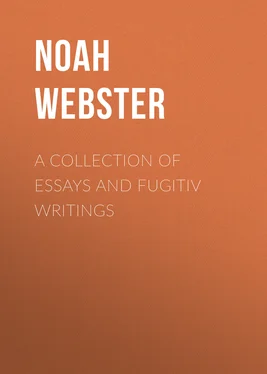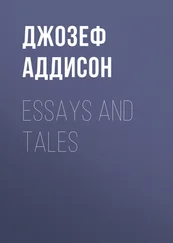Noah Webster - A Collection of Essays and Fugitiv Writings
Здесь есть возможность читать онлайн «Noah Webster - A Collection of Essays and Fugitiv Writings» — ознакомительный отрывок электронной книги совершенно бесплатно, а после прочтения отрывка купить полную версию. В некоторых случаях можно слушать аудио, скачать через торрент в формате fb2 и присутствует краткое содержание. Жанр: foreign_prose, foreign_antique, на английском языке. Описание произведения, (предисловие) а так же отзывы посетителей доступны на портале библиотеки ЛибКат.
- Название:A Collection of Essays and Fugitiv Writings
- Автор:
- Жанр:
- Год:неизвестен
- ISBN:нет данных
- Рейтинг книги:5 / 5. Голосов: 1
-
Избранное:Добавить в избранное
- Отзывы:
-
Ваша оценка:
- 100
- 1
- 2
- 3
- 4
- 5
A Collection of Essays and Fugitiv Writings: краткое содержание, описание и аннотация
Предлагаем к чтению аннотацию, описание, краткое содержание или предисловие (зависит от того, что написал сам автор книги «A Collection of Essays and Fugitiv Writings»). Если вы не нашли необходимую информацию о книге — напишите в комментариях, мы постараемся отыскать её.
A Collection of Essays and Fugitiv Writings — читать онлайн ознакомительный отрывок
Ниже представлен текст книги, разбитый по страницам. Система сохранения места последней прочитанной страницы, позволяет с удобством читать онлайн бесплатно книгу «A Collection of Essays and Fugitiv Writings», без необходимости каждый раз заново искать на чём Вы остановились. Поставьте закладку, и сможете в любой момент перейти на страницу, на которой закончили чтение.
Интервал:
Закладка:
Two regulations are essential to the continuance of republican governments: 1. Such a distribution of lands and such principles of descent and alienation, as shall give every citizen a power of acquiring what his industry merits. 10 10 The power of entailing real estates is repugnant to the spirit of our American governments.
2. Such a system of education as gives every citizen an opportunity of acquiring knowlege and fitting himself for places of trust. These are fundamental articles; the sine qua non of the existence of the American republics.
Hence the absurdity of our copying the manners and adopting the institutions of Monarchies.
In several States, we find laws passed, establishing provision for colleges and academies, where people of property may educate their sons; but no provision is made for instructing the poorer rank of people, even in reading and writing. Yet in these same States, every citizen who is worth a few shillings annually, is entitled to vote for legislators. 11 11 I have known instructions from the inhabitants of a county, two thirds of whom could not write their names. How competent must such men be to decide an important point in legislation!
This appears to me a most glaring solecism in government. The constitutions are republican , and the laws of education are monarchical . The former extend civil rights to every honest industrious man; the latter deprive a large proportion of the citizens of a most valuable privilege.
In our American republics, where government is in the hands of the people, knowlege should be universally diffused by means of public schools. Of such consequence is it to society, that the people who make laws, should be well informed, that I conceive no Legislature can be justified in neglecting proper establishments for this purpose.
When I speak of a diffusion of knowlege, I do not mean merely a knowlege of spelling books, and the New Testament. An acquaintance with ethics, and with the general principles of law, commerce, money and government, is necessary for the yeomanry of a republican state. This acquaintance they might obtain by means of books calculated for schools, and read by the children, during the winter months, and by the circulation of public papers.
"In Rome it was the common exercise of boys at school, to learn the laws of the twelve tables by heart, as they did their poets and classic authors." 12 12 Middleton's life of Cicero, volume 1, page 14.
What an excellent practice this in a free government!
It is said, indeed by many, that our common people are already too well informed. Strange paradox! The truth is, they have too much knowlege and spirit to resign their share in government, and are not sufficiently informed to govern themselves in all cases of difficulty.
There are some acts of the American legislatures which astonish men of information; and blunders in legislation are frequently ascribed to bad intentions. But if we examin the men who compose these legislatures, we shall find that wrong measures generally proceed from ignorance either in the men themselves, or in their constituents. They often mistake their own interest, because they do not foresee the remote consequences of a measure.
It may be true that all men cannot be legislators; but the more generally knowlege is diffused among the substantial yeomanry, the more perfect will be the laws of a republican state.
Every small district should be furnished with a school, at least four months in a year; when boys are not otherwise employed. This school should be kept by the most reputable and well informed man in the district. Here children should be taught the usual branches of learning: submission to superiors and to laws; the moral or social duties; the history and transactions of their own country; the principles of liberty and government. Here the rough manners of the wilderness should be softened, and the principles of virtue and good behaviour inculcated. The virtues of men are of more consequence to society than their abilities ; and for this reason, the heart should be cultivated with more assiduity than the head .
Such a general system of education is neither impracticable nor difficult; and excepting the formation of a federal government that shall be efficient and permanent, it demands the first attention of American patriots. Until such a system shall be adopted and pursued; until the Statesman and Divine shall unite their efforts in forming the human mind, rather than in loping its excressences, after it has been neglected; until Legislators discover that the only way to make good citizens and subjects, is to nourish them from infancy; and until parents shall be convinced that the worst of men are not the proper teachers to make the best ; mankind cannot know to what a degree of perfection society and government may be carried. America affords the fairest opportunities for making the experiment, and opens the most encouraging prospect of success. 13 13 It is worthy of remark, that in proportion as laws are favorable to the equal rights of men, the number of crimes in a state is diminished; except where the human mind is debased by extreme servitude, or by superstition. In France, there are but few crimes; religion and the rigor of a military force prevent them; perhaps also, ignorance in the peasantry may be assigned as another reason. But in England and Ireland the human mind is not so depressed, yet the distribution of property and honors is not equal; the lower classes of people, bold and independent, as well as poor, feel the injuries which flow from the feudal system, even in its relaxed state; they become desperate, and turn highwaymen. Hence those kingdoms produce more culprits than half Europe besides. The character of the Jews, as sharpers, is derived from the cruel and villanous proscriptions, which they have suffered from the bigotry of Christians in every part of Europe. Most of the criminals condemned in America are foreigners. The execution of a native, before the revolution, was a novelty. The distribution of property in America and the principles of government favor the rights of men; and but few men will commence enemies to society and government, if they can receive the benefits of them. Unjust governments and tyrannical distinctions have made most of the villains that ever existed.
In a system of education, that should embrace every part of the community, the female sex claim no inconsiderable share of our attention.
The women in America (to their honor it is mentioned) are not generally above the care of educating their own children. Their own education should therefore enable them to implant in the tender mind, such sentiments of virtue, propriety and dignity, as are suited to the freedom of our governments. Children should be treated as children, but as children that are, in a future time, to be men and women. By treating them as if they were always to remain children, we very often see their childishness adhere to them, even in middle life. The silly language called baby talk , in which most persons are initiated in infancy, often breaks out in discourse, at the age of forty, and makes a man appear very ridiculous. 14 14 It has been already observed that a child always imitates what he sees and hears: For this reason, he should hear no language which is not correct and decent. Every word spoken to a child, should be pronounced with clearness and propriety. Banish from children all diminutive words, all whining and all bad grammar. A boy of six years old may be taught to speak as correctly, as Cicero did before the Roman Senate.
In the same manner, vulgar, obscene and illiberal ideas, imbibed in a nursery or a kitchen, often give a tincture to the conduct through life. In order to prevent every evil bias, the ladies, whose province it is to direct the inclinations of children on their first appearance, and to choose their nurses, should be possessed, not only of amiable manners, but of just sentiments and enlarged understandings.
Интервал:
Закладка:
Похожие книги на «A Collection of Essays and Fugitiv Writings»
Представляем Вашему вниманию похожие книги на «A Collection of Essays and Fugitiv Writings» списком для выбора. Мы отобрали схожую по названию и смыслу литературу в надежде предоставить читателям больше вариантов отыскать новые, интересные, ещё непрочитанные произведения.
Обсуждение, отзывы о книге «A Collection of Essays and Fugitiv Writings» и просто собственные мнения читателей. Оставьте ваши комментарии, напишите, что Вы думаете о произведении, его смысле или главных героях. Укажите что конкретно понравилось, а что нет, и почему Вы так считаете.












